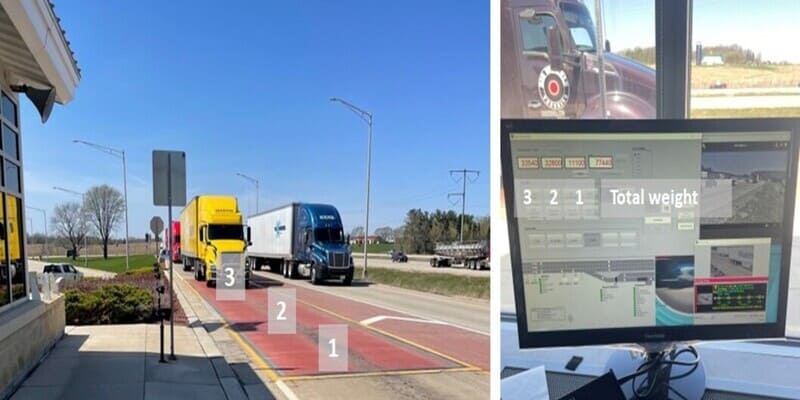The Evolution of Truck Stops and Weigh Stations: What’s Changed?

For decades, truck stops were just places to refuel and rest, and weigh stations were simple checkpoints for weight compliance. But as technology advances and the needs of drivers evolve, these facilities have undergone a major transformation.
Let’s take a closer look at how truck stops and weigh stations have changed and why these changes matter for drivers today.
A Look Back: The Origins of Truck Stops and Weigh Stations
To understand how far these facilities have come, it helps to look back at their origins. Decades ago, truck stops were little more than gas stations with parking lots. Drivers could refuel and grab a snack, but amenities were minimal. Similarly, weigh stations were basic checkpoints where trucks were manually inspected for weight compliance.

As interstate highways expanded in the mid-20th century, truck stops grew into full-service hubs. Diners, showers, and repair shops became common. Weigh stations also evolved, introducing electronic scales to speed up inspections. However, these improvements were still limited by the technology of the time.
Fast forward to the 2000s and beyond, and the rise of technology has brought significant changes. For drivers seeking directions to the closest truck stop, modern GPS navigation apps, loyalty programs, and RFID systems have improved their experience with these facilities.
Today, truck stops and weigh stations are equipped with advanced amenities that save time, improve safety, and enhance comfort.
Modern Truck Stops: A New Level of Comfort and Convenience
Modern truck stops are now full-service hubs designed to make life on the road easier and more comfortable. Truck stops now offer a wide range of amenities to meet drivers' needs, focusing on convenience, health, and efficiency. Here’s a closer look at what modern truck stops provide:
- Healthier meal choices: Truck stops now offer healthier options, including fresh salads, grilled items, and vegetarian/vegan dishes. They may also partner with popular restaurant chains.
- Relaxation: Showers, laundry facilities, and lounges are standard, and some truck stops offer fitness centers, massage chairs, and sleep pods. Free Wi-Fi, charging stations, and entertainment options are also available.
- Driver health: Wellness programs, including blood pressure checks, flu shots, and mental health resources, are offered. Some truck stops partner with healthcare providers for on-site medical services.
- EV charging stations: With the rise of hybrid and electric trucks, many truck stops now offer EV charging stations. Apps like Pilot Flying J’s MyRewards+ and Love’s Connect allow drivers to earn discounts on fuel, food, and amenities. These programs not only save money but also encourage drivers to plan their stops strategically.
Weigh Stations Get Smarter: Automation and Efficiency
Weigh stations have also seen significant upgrades, evolving from manual checkpoints into high-tech facilities. Modern weigh stations use advanced technology to streamline the inspection process. For example, RFID systems allow compliant vehicles to bypass physical inspections to save time.
Some weigh stations now use AI to analyze data and predict compliance issues before they arise. For instance, if a truck is flagged for potential overweight violations, the system can notify the driver in advance.
Weigh stations are essential for upholding stricter regulations. Overweight penalties have increased, with fines now averaging 750–1,500 per violation. Repeat offenders face even steeper penalties, including impoundment fees and mandatory compliance training.
Real-time monitoring ensures that non-compliant vehicles are flagged immediately, reducing the risk of accidents and road damage. Modern weigh stations also aim to minimize disruptions for drivers. Open-lane policies during off-peak hours reduce delays, and mobile apps ensure quick and accurate information about whether a weigh station is open, closed, or operating with bypass options. For drivers searching for a weigh station near me, some tools help them stay compliant while saving time.
Read More: Importance Of Dash Cams In the Trucking Industry
Why Do These Changes Matter for Drivers Today?
These changes have had a profound impact on drivers’ lives. Modern truck stops offer everything drivers need to stay comfortable and focused. From hot meals to fitness centers, these amenities help combat fatigue and stress. Access to showers and laundry facilities makes long hauls more manageable, while fitness centers promote physical health.
Automation at weigh stations means less time spent waiting in line. Bypass systems allow compliant drivers to skip physical inspections, saving valuable time. Mobile apps also help drivers plan routes more efficiently, avoiding unnecessary detours.
Loyalty programs and discounted fuel prices at truck stops save drivers money. Meanwhile, avoiding overweight fines and impoundment fees keeps expenses low. Strategic planning and stopping at weigh stations can save you $1,500 or more, the cost of a single overweight citation.
With a greater focus on driver well-being, these facilities help promote healthier lifestyles and safer driving practices. Access to nutritious meals, fitness equipment, and wellness programs reduces the risk of chronic health issues like obesity and heart disease.
The evolution of truck stops and weigh stations reflects the broader changes in the trucking industry. Truck stops have evolved from simple rest areas into modern, technologically advanced facilities catering to the needs of today's truck drivers.

Mahesh Kumar is a dynamic marketing consultant and tech enthusiast with a passion for driving business growth through his innovative strategies and cutting-edge technology. With 6 years of experience in the industry, he has helped numerous businesses leverage the power of digital marketing to reach their target audience, build brand awareness, and increase sales.








